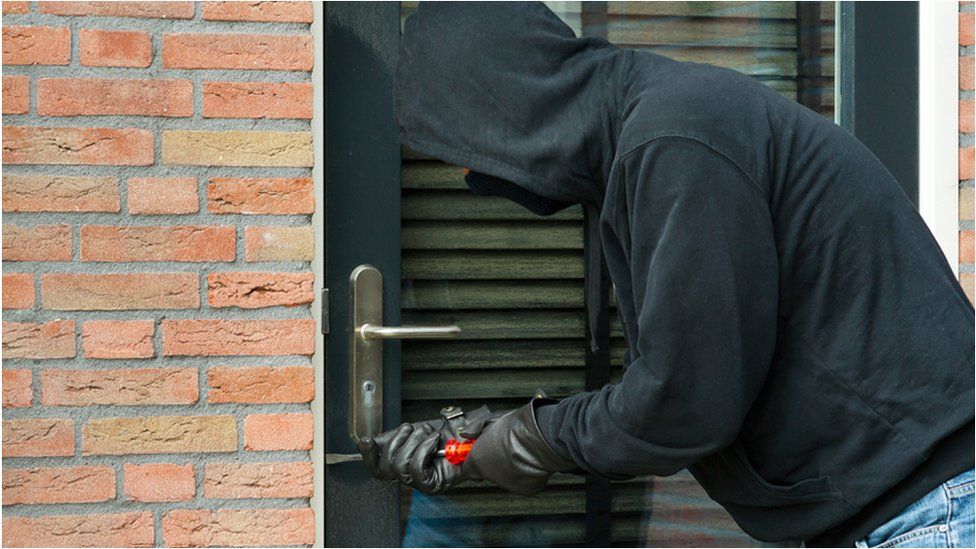Crime calculator: Find your personal risk of being a victim
- Published

Are you scared of being a victim of crime?
Today, for the first time, BBC News, working with the Office for National Statistics, is providing you with a way of understanding your risk of being a victim of crime in England and Wales. If you are interested in Scotland, you can find out more about the Scottish Crime Survey on its official website.
The tool below uses national crime statistics, your address and your personal characteristics to tell you what's happened to people similar to you in the last year - and therefore something approaching a personal estimate of how likely you are to be a victim.
It only takes a moment to fill in, and the BBC does not keep the data, so punch in your details and have a look at the results:
Sorry, your browser cannot display this content
So were you surprised?
Week in, week out, journalists like myself report on the big crime trends across the nation. And you will almost certainly notice the tool tells a different story - a personal one.
Now, it's worth pointing out that it has some limitations. The Crime Survey of England and Wales, which provides most of the data in the calculator, captures a wide range of real experiences of crime, but some things are very difficult to measure, such as risky lifestyles and behaviour.
Be that as it may, the tool does tell us a lot. And if you try changing your age - and even your gender - you learn a lot more about how crime affects us depending on who we are and our stage in life.
Young men vs old ladies
So, for instance, the tool shows that people like me, living in an area like mine, have a very low risk of being a victim of violence. If I were aged between 16 and 29 (sadly those days are gone) and living in the same area, my risk of being assaulted is five times greater.
If I were a woman in my 60s, I'd be even less likely to be a victim.
Put most simply, young men in areas of higher deprivation are the most likely victims of crime. Old ladies living in the same areas - among those who are most likely to fear crime - have a lower risk. There is a dividend for living in a posher area - but age and gender remain key factors too.
Now, there are a lot of nuances in here - and you can drill into the ONS's data tables for the full facts - or read this highly digestible analysis from Victim Support.
But many of these differences come down to how we live our lives.
Younger people spend more time out at night. They're more likely to come into contact with people who become violent after they have had one too many drinks.
How many parents have had to console a teenager who's had their bike or mobile phone stolen?
When kids move out of home, start work or become a student, they're likely to be living in cheaper, less-secure, rented accommodation.
But as they get older, the security of stable employment leads to security at home and family life. And you're less likely to be burgled if you've sunk into the sofa watching a box set, rather than if you've gone to the pub.
Every time a home is renovated, it's harder to break in to than before. Each new car we buy tends to be more secure than its predecessors.
But here's the thing.
That's not actually how we perceive crime and our personal risk. In fact, what we think is happening can be at complete odds with what is actually going on.
According to the most recent data from the ONS, people generally have a pretty good idea about how much crime is close to them. Their perceptions seem to match the reality. But 60% also thought that crime is rising across the country as a whole - even though the long-term trend is down.
The people with the highest risk of being a victim - the young - were less likely to be worried than older generations, even though the older you become, the safer things generally become.
Dr Jane Wood, a forensic psychologist at the University of Kent, says a range of factors influence this perception gap. Women for instance fear crime because they know they cannot fight off a younger man. But our perceptions are also influenced by what we see around us - and how we hear about.
When the ONS asked interviewees to choose from a list of what most influenced their perceptions of national crime levels, people talked about television, radio, newspapers (tabloid and broadsheet), the internet and word of mouth. And, Dr Wood says, the more we read or watch about crime, the more we think about it.
All of which may be an argument for not listening to a word that journalists like me tell you.
But while I wait for the hue and cry to drag me from the newsroom, please share a link to the crime risk calculator.
- Published30 August 2017
- Published27 April 2017
- Published27 April 2017
- Published9 March 2017